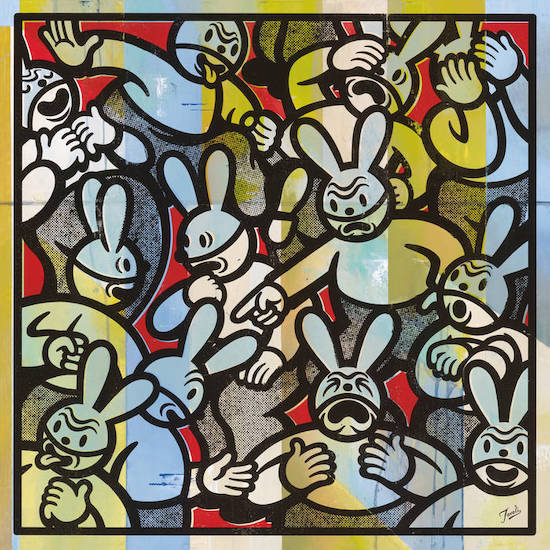The argument of technique versus untutored spontaneity is one of the longest-running debates in music. It underlies the divide between prog and punk; even though, for many pundits, there appears to be the temptation to dismiss existing technique altogether, clearly there are arguments to be made for the validity of both. Training can end up limiting the imagination and sometimes there is much benefit to be gained from just picking up an instrument and learning one’s own way, eschewing tradition. Yet this doesn’t necessarily mean throwing it out completely, refuting the absolute reality of existing scales and creating your own systems as, for example, Harry Partch did.
The moment where the classically trained Fred Frith (of Henry Cow) first heard Black American blues music is illuminating in this respect. Frith was said to be utterly captivated by the emotion and freedom of the music and it was a moment of epiphany for him to realise that he didn’t have to play just what was ‘on the page’. Really, it’s the effortlessness that is sought here – the ability to jump from the mind into the moment, as seasoned improvisers are able to do. That could come through years of practice, obliterated in an instant by introducing stochastic elements such as throwing rice at your guitar, as Frith chose to do. Or it could come from avoiding the taught approach entirely and simply doing what you enjoy from your own perspective. This is what Half Japanese have been doing since their inception in 1974. They too have a foot in both camps, having never lost their wide-eyed enthusiasm and purity of expression, yet developing during that time, if not chops exactly, but a strongly intuitive grasp of rock, pop, folk, punk and whatever other elements they might choose to throw into the mix. In this respect, although their early records had more of a shock of the new about them, it’s their later output that really shines.
Their last album, 2020s Crazy Hearts, was especially strong. A mix of emotionally darker hued material alongside Jad Fair’s renowned, almost mystical-grade optimism, that concluded with the beautiful and hopeful ‘Let It Show’. Jump Into Love hits similar heights but takes some alternate routes getting there, and notably chooses to end on a different emotional vibe entirely. As well as providing a relative ease of access to methods of creativity, one aspect of the DIY scene that always appealed was its collage-like attitude towards genre. Jump Into Love incorporates a broader palette of elements than its predecessor, adding elements of jazz, overblown MC5-style amp abuse, folk and krautrock chug, whilst retaining an irrepressible ebullience that at times even recalls the baggy transcendental jams of early Happy Mondays.
The approach results in several standout tracks and a beguiling overall tapestry of tunes told in different yet complimentary styles. Driven nimbly along by John Sluggett’s loose and jazz-informed drumming and Jason Willett’s infectious bass, title track ‘Jump Into Love’ is an immediate high point. The combination of dance-worthy groove and jazz breakdown with a generous helping of guitar fuzz offers a perfect backing to Jad Fair’s extemporaneous lyrical delivery. ‘Listen To The Bells Chime’ brings to mind the curious but oddly not unwelcome image of the 69-year-old Fair shaking maracas Bez-style while incanting aspirational mantras evoking the “super powers” of cheerfulness and acceptance of good fortune. ‘Shining Stars’ clearly references the two great musical influences of Fair’s early years, MC5 and the Stooges, but adds so much reverb that it sounds as if the Michigan legends are playing inside a room filled with jelly. It’s a simple trick that brings recognition of a familiar sound, whilst making it seem simultaneously alien, in a fun kind of way.
On ‘Shining Sun’, Fair insists with great conviction, that “everything’s going to be OK”. It’s a perspective that could very easily descend into triteness, but it’s to Fair’s credit that it never comes off as such. In many respects, one could view Jad Fair as the anti-David Thomas, for his largely choosing to be on the side of love, hope and happiness, as opposed to the Pere Ubu frontman’s use of paranoia, fear and alienation. Yet Fair isn’t being simply naïve either, as the final track and absolute high point, ‘Zombie World’, makes plain. Following on the heels of the unbridled optimism that precedes it, the track’s eerie elegiac folk hits especially hard. As the world heads towards destruction through climate change, the movement towards fascist populist governments and potential annihilation through warfare, it’s hard not to agree with Fair’s estimation of there being “Zombies one and all” asleep behind the wheel. Combining the album’s most beautiful track with its darkest sentiment offers a surprising denouement which sends a chill up one’s spine and casts Fair’s famous optimism in a different, more sophisticated light. Jad Fair knows what time it is and yet he still offers hope, which makes his positive qualities appear all the more authentic and necessary in these dark times. That is the essence of this record, whilst still acknowledging the perilous near proximity of the void, we can choose instead to Jump Into Love.


